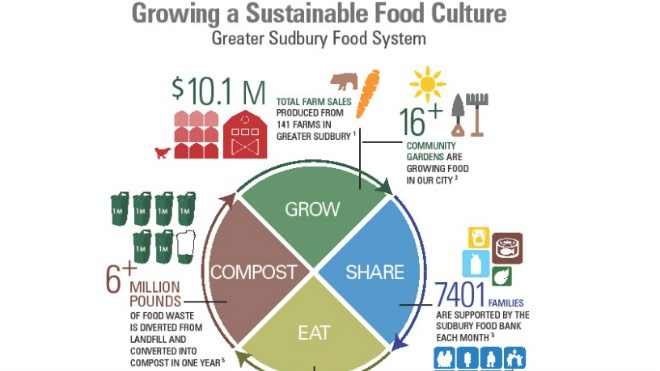If disaster of one sort of another were to strike, Greater Sudbury has less than five days worth of food to sustain the population, the city's planning commitee heard Monday.
That stark reality was among the updates councillors received on the reasons why a local food strategy is being developed.
Jennifer Babin-Fenske, the co-ordinator of EarthCare Sudbury Initiative, said one of the goals of the strategy is to extend the amount of food on hand to last at least five to 10 days in the event of an emergency.
She said more and more people are understanding the importance of the issues and of supporting local agriculture.
“There has been an increase in awareness around our local food system,” Babin-Fenske said. “A lot of people know about our local potatoes ... but we want them to know more.”
Part of the strategy is to boost the amount of food we eat that's grown closer to home. Currently, that stands at about two per cent, with the goal of growing it to 10 per cent.
A big part of getting there is to increase awareness of what's available locally and where to find it.
“Everyone knows groceries stores, but do they know about local producers and where to find them?” she said.
Ward 4 Coun. Evelyn Dutrisac said there used to be several farmers in Rayside-Balfour and other parts of the city decades ago, but making a living has become increasingly hard. There are many farmers struggling to keep working their land, Dutrisac said.
“What are we doing to encourage farmers?” she asked. “What are we doing to really encourage people to keep their farms ... People don't have the funds to grow them.”
Babin-Fenske said community consultations are planned where they will talk to farmers and get their feedback on what they think needs to be done.
Dutrisac also wondered about how the city can urge more people to grow food themselves, and to educate people about the Canada Food Guide and the importance of nutrition.
“How can we promote these types of urban gardens?” she said. “You don't need an acre or two to grow food.”
Babin-Fenske said finding ways to promote food literacy is part of the food council's action plan.
“There's a number of people at the table who will put forward suggestions,” she said, adding that the strategy is still in its early stages.
“A food strategy is a document that identifies short and long-term actions to help enhance our current food system and prepare for growth and change in the future. Specifically, that includes growing, rearing or foraging for food, processing food, preparing food for consumption for households and food service industry, eating food and composting the remains.”
Part of the plan will be to find ways to encourage local restaurants and large institutions such as schools and hospitals to buy and use more food in their meals.
The process could also include revising the city's sign bylaws to help local food producers reach customers.
